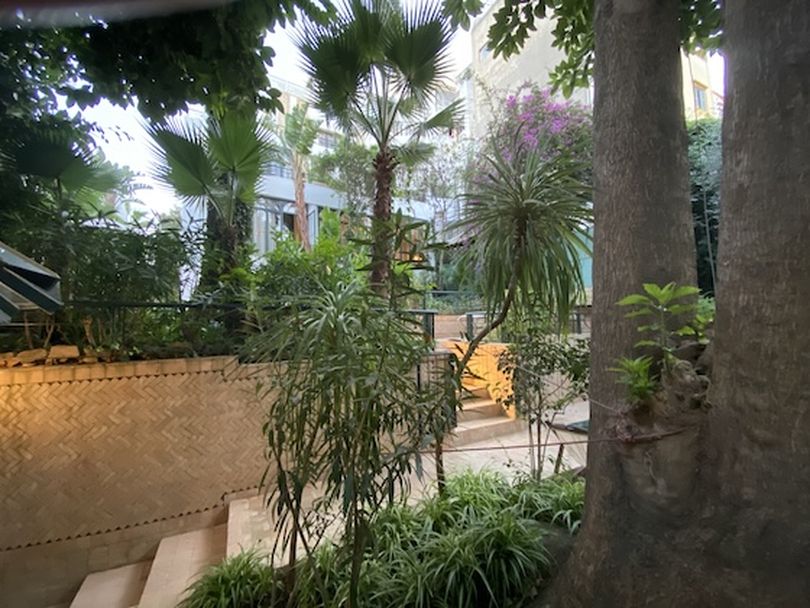Tangier: the city that beguiled a playwright

It was sometime in the mid-1970s when I first saw a production of the Tennessee Williams play “Camino Real.” My first wife, Freddie Jenkins, was preparing to enter graduate school in theater at the University of Oregon and so had been preparing by playing parts in productions put on by the theater department at the University of California, San Diego.
“Camino Real” (Williams insists on pronouncing it CA-mi-noh REEL) was one of plays she appeared in. And I remember it not just because it was typical of the professional nature of the department as it was then run. It was just as much because, though I was familiar with Williams’ plays – from “The Glass Menagerie” to “A Streetcar Named Desire,” “Cat on a Hot Tin Roof” and others – I had never heard of “Camino Real.”
That’s not surprising. Though it has been revived a number of times, it’s never captured audiences the way Williams’ other works have. When it opened on Broadway in 1953, New York Times critic Brooks Atkinson described it as a “cosmic fantasy” and criticized Williams’ “fantasies that boil through the central plaza of the play (that) have a psychopathic bitterness in them.”
Perhaps as a result, though directed by Elia Kazan and starring Eli Wallach in the lead role, the first Broadway run of “Camino Real” lasted only 60 performances before closing.
Yet for a variety of reasons the UCSD production spoke to me. One reason was because Freddie was in it. Another might have been because of the characters that Williams uses, among them Kilroy of “Kilroy was here” fame, Don Quixote and Casanova. One that stood out, though, was Gutman, the very character played by Sydney Greenstreet in John Huston’s 1941 film “The Maltese Falcon.”
And yet another reason was that Williams wrote at least part of the play in Tangier, Morocco, a city that he visited often from the early 1950s through the early ’70s. And when I toured Morocco in 2019 (with the woman, Mary Pat Treuthart, whom I have been married to since 1995), we made a special point of visiting Tangier, too.
The city sits at the northern-most tip of Morocco, just across from Spain and abutting the Straits of Gibraltar. As such, the nights are often shrouded in mist. And that misty feeling was used so effectively by writer-director Jim Jarmusch in his 2013 vampire film “Only Lovers Left Alive.”
Mary Pat, who loves that film, had a fantasy of walking the streets of Tangier and indulging in the romance of that movie dream (without the blood-sucking, of course). I, meanwhile, was more intent on discovering where and how the playwright Williams had lived … while imagining what went through his mind while writing “Camino Real.”
Neither of us ended up completely satisfied.
Oh, we stayed in the nicest hotel, one that fronted on a lush indoor garden. And when out walking, we managed to find an overview that gave us a great vantage point to see across the mouth of the Mediterranean to the mountainous peninsula we knew was Spain. And I was even able to locate the house that Williams supposedly rented during one of his several visits.
But all that was balanced by the same kind of negative situation that we’ve had to face in a number of other places – on Mexican beaches, for example, as well as in Italian and Indian train stations and on Ukrainian and South African street corners.
It’s a situation that occurs often when comparatively affluent travelers are confronted by those less fortunate. In the case of Tangier, we were approached by a group of young men who, despite our best efforts, would not leave us alone.
It’s not that I felt threatened (as I have in other places, even in the U.S.). It’s just that I was annoyed. No matter how much we attempted to dissuade them, they continued to follow us. One of them – a pleasant enough kid otherwise – even kept on rattling off facts that he’d no doubt committed to memory.
We finally cut our walk short and let the boys know that we were heading back to our hotel. But before we departed, I ended up handing our erstwhile guide a few euros. More than a few, actually. It was far more than I should have, and Mary Pat wasn’t happy about it. But, truth be told, I actually had enjoyed his good humor, I felt that I’d learned something – and, to be honest, I felt sorry for him.
The whole experience reminded me of Williams’ play, which in its so-called “cosmic fantasy” is set in a tropical seaport, with all the action taking place in a single plaza that fronts the hotel Siete Mares (or Seven Seas).
After the boys finally left us, we stumbled onto a plaza that could have been one that inspired Williams. In any event, walking through it caused me to think about his play and some of the work’s more memorable lines.
One, for example, is “There is a time for departure even when there's no certain place to go.” Another is “When so many are lonely as seem to be lonely, it would be inexcusably selfish to be lonely alone.”
In the decades since I sat through weeks of rehearsals and then several performances of the UCSD production, I’ve periodically recalled such lines. One from the play, however, speaks volumes to all travelers – especially to those who head for foreign shores.
“Make voyages,” Williams wrote. “Attempt them. There's nothing else.”
